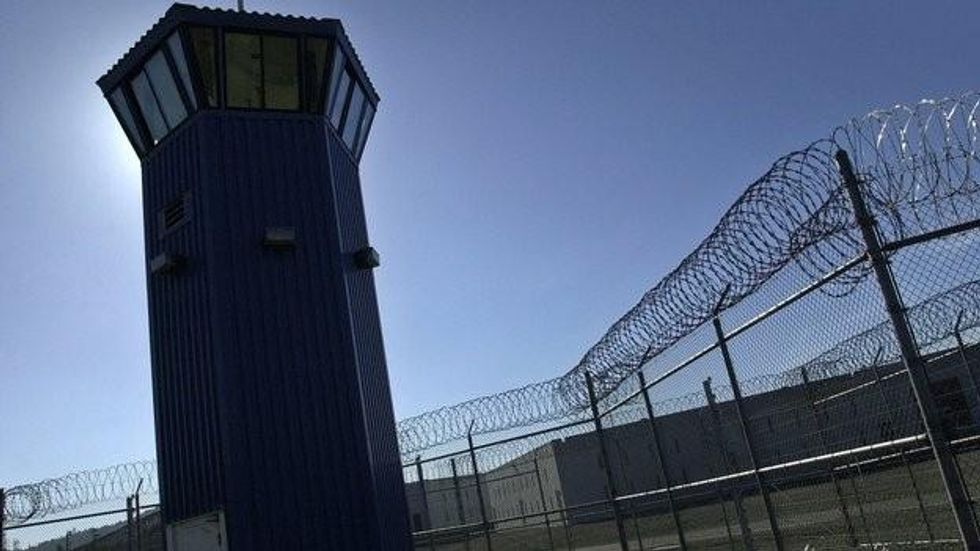When Prisons Retaliate: Calif. Inmates Still Paying Price for Demanding Rights
'We demand an end to retaliation, and those demands are entwined with continued political organizing work to change the system'

"We demand an end to retaliation, and those demands are entwined with continued political organizing work to change the system," said Isaac Ontiveros, with the Prisoner Hunger Strike Solidarity Coalition and Critical Resistance, in an interview with Common Dreams. "It is the minimum of human decency to not retaliate against people who participated in the peaceful protest."
Prisoners who participated in the California-wide prisoner hunger strike, launched July eighth, have been slammed with what are called a '115 write-ups.' The penalty accuses the prisoners "of committing a serious rule violation" for participation in the hunger strike, according to a statement from the Prisoner Hunger Strike Solidarity Coalition.
The write-ups have serious consequences for inmates who can face years-long extensions of their solitary confinement and denial of parole as a result. "It is something that goes into your record, so that when you are reviewed for whatever reason around parole, moving from one place to another, it affects the nature of your imprisonment," Ontiveros explains.
"People perceived as supporting the strike, whether refusing meals, refusing work, or supporting the strike with other action faced retaliation," said attorney Caitlin Kelly-Henry in an interview with Common Dreams. "As many as 30,000 people are documented as refusing meals at the time the strike was declared. We don't have numbers of people who refused work. It could be as many as hundreds or thousands of people who faced 115 and other write-ups."
The 115 write-ups are part of broad retaliatory measures inflicted against prisoners who participated in the hunger strike, including searching cells, obstructing inmates' communications with the outside world--including lawyers--punishing strikers with more severe solitary confinement, and intimidating inmates to prevent them from appealing the harsh measures. Prisons were also given the green light to force-feed hunger striking prisoners--a move that human rights advocates slammed as a gross violation of human rights.
Much retaliation is informal, in an environment where prison guards hold staggering power over the lives of inmates. "We've received letters around individual guards or groups of guards targeting people who participated in the strike," explains Ontiveros. "This is highly racialized, with high incidence of targeting of black prisoners who participated in the strike."
In a legislative hearing last month with the California Department of Corrections and Rehabilitation--won by the prisoner hunger strikes and outside support--prison authorities admitted they retaliated against inmates who participated in the hunger strikes, says Ontiveros.
Supporters of the inmates are demanding that Michael Stainer, Director of the Division of Adult Institutions at CDCR, use his authority to immediately reverse the retaliatory measure.
Stainer's office did not immediately respond to repeated requests from Common Dreams for an interview.
Ontiveros says that as supporters on the outside demand an end for retaliation, and push for legislative hearings, they also work to "end the CDCR's repression that leads to solitary confinement.
"This is an important moment to act in very strong solidarity," he added.
_____________________
An Urgent Message From Our Co-Founder
Dear Common Dreams reader, The U.S. is on a fast track to authoritarianism like nothing I've ever seen. Meanwhile, corporate news outlets are utterly capitulating to Trump, twisting their coverage to avoid drawing his ire while lining up to stuff cash in his pockets. That's why I believe that Common Dreams is doing the best and most consequential reporting that we've ever done. Our small but mighty team is a progressive reporting powerhouse, covering the news every day that the corporate media never will. Our mission has always been simple: To inform. To inspire. And to ignite change for the common good. Now here's the key piece that I want all our readers to understand: None of this would be possible without your financial support. That's not just some fundraising cliche. It's the absolute and literal truth. We don't accept corporate advertising and never will. We don't have a paywall because we don't think people should be blocked from critical news based on their ability to pay. Everything we do is funded by the donations of readers like you. Will you donate now to help power the nonprofit, independent reporting of Common Dreams? Thank you for being a vital member of our community. Together, we can keep independent journalism alive when it’s needed most. - Craig Brown, Co-founder |

"We demand an end to retaliation, and those demands are entwined with continued political organizing work to change the system," said Isaac Ontiveros, with the Prisoner Hunger Strike Solidarity Coalition and Critical Resistance, in an interview with Common Dreams. "It is the minimum of human decency to not retaliate against people who participated in the peaceful protest."
Prisoners who participated in the California-wide prisoner hunger strike, launched July eighth, have been slammed with what are called a '115 write-ups.' The penalty accuses the prisoners "of committing a serious rule violation" for participation in the hunger strike, according to a statement from the Prisoner Hunger Strike Solidarity Coalition.
The write-ups have serious consequences for inmates who can face years-long extensions of their solitary confinement and denial of parole as a result. "It is something that goes into your record, so that when you are reviewed for whatever reason around parole, moving from one place to another, it affects the nature of your imprisonment," Ontiveros explains.
"People perceived as supporting the strike, whether refusing meals, refusing work, or supporting the strike with other action faced retaliation," said attorney Caitlin Kelly-Henry in an interview with Common Dreams. "As many as 30,000 people are documented as refusing meals at the time the strike was declared. We don't have numbers of people who refused work. It could be as many as hundreds or thousands of people who faced 115 and other write-ups."
The 115 write-ups are part of broad retaliatory measures inflicted against prisoners who participated in the hunger strike, including searching cells, obstructing inmates' communications with the outside world--including lawyers--punishing strikers with more severe solitary confinement, and intimidating inmates to prevent them from appealing the harsh measures. Prisons were also given the green light to force-feed hunger striking prisoners--a move that human rights advocates slammed as a gross violation of human rights.
Much retaliation is informal, in an environment where prison guards hold staggering power over the lives of inmates. "We've received letters around individual guards or groups of guards targeting people who participated in the strike," explains Ontiveros. "This is highly racialized, with high incidence of targeting of black prisoners who participated in the strike."
In a legislative hearing last month with the California Department of Corrections and Rehabilitation--won by the prisoner hunger strikes and outside support--prison authorities admitted they retaliated against inmates who participated in the hunger strikes, says Ontiveros.
Supporters of the inmates are demanding that Michael Stainer, Director of the Division of Adult Institutions at CDCR, use his authority to immediately reverse the retaliatory measure.
Stainer's office did not immediately respond to repeated requests from Common Dreams for an interview.
Ontiveros says that as supporters on the outside demand an end for retaliation, and push for legislative hearings, they also work to "end the CDCR's repression that leads to solitary confinement.
"This is an important moment to act in very strong solidarity," he added.
_____________________

"We demand an end to retaliation, and those demands are entwined with continued political organizing work to change the system," said Isaac Ontiveros, with the Prisoner Hunger Strike Solidarity Coalition and Critical Resistance, in an interview with Common Dreams. "It is the minimum of human decency to not retaliate against people who participated in the peaceful protest."
Prisoners who participated in the California-wide prisoner hunger strike, launched July eighth, have been slammed with what are called a '115 write-ups.' The penalty accuses the prisoners "of committing a serious rule violation" for participation in the hunger strike, according to a statement from the Prisoner Hunger Strike Solidarity Coalition.
The write-ups have serious consequences for inmates who can face years-long extensions of their solitary confinement and denial of parole as a result. "It is something that goes into your record, so that when you are reviewed for whatever reason around parole, moving from one place to another, it affects the nature of your imprisonment," Ontiveros explains.
"People perceived as supporting the strike, whether refusing meals, refusing work, or supporting the strike with other action faced retaliation," said attorney Caitlin Kelly-Henry in an interview with Common Dreams. "As many as 30,000 people are documented as refusing meals at the time the strike was declared. We don't have numbers of people who refused work. It could be as many as hundreds or thousands of people who faced 115 and other write-ups."
The 115 write-ups are part of broad retaliatory measures inflicted against prisoners who participated in the hunger strike, including searching cells, obstructing inmates' communications with the outside world--including lawyers--punishing strikers with more severe solitary confinement, and intimidating inmates to prevent them from appealing the harsh measures. Prisons were also given the green light to force-feed hunger striking prisoners--a move that human rights advocates slammed as a gross violation of human rights.
Much retaliation is informal, in an environment where prison guards hold staggering power over the lives of inmates. "We've received letters around individual guards or groups of guards targeting people who participated in the strike," explains Ontiveros. "This is highly racialized, with high incidence of targeting of black prisoners who participated in the strike."
In a legislative hearing last month with the California Department of Corrections and Rehabilitation--won by the prisoner hunger strikes and outside support--prison authorities admitted they retaliated against inmates who participated in the hunger strikes, says Ontiveros.
Supporters of the inmates are demanding that Michael Stainer, Director of the Division of Adult Institutions at CDCR, use his authority to immediately reverse the retaliatory measure.
Stainer's office did not immediately respond to repeated requests from Common Dreams for an interview.
Ontiveros says that as supporters on the outside demand an end for retaliation, and push for legislative hearings, they also work to "end the CDCR's repression that leads to solitary confinement.
"This is an important moment to act in very strong solidarity," he added.
_____________________

